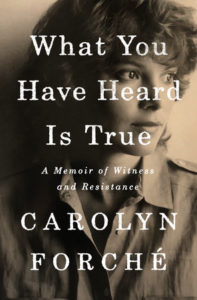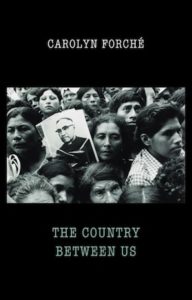From The Country Between Us
by Carolyn ForchéCarolyn Forché’s The Country Between Us bears witness to what she saw in El Salvador in the late 1970s, when she travelled around a country erupting into civil war. Documenting killings and other brutal human rights abuses while working alongside Archbishop Oscar Romero’s church group, she found in her poetry the only possible way to come to terms with what she was experiencing first-hand.
Briefly available in Britain from Jonathan Cape in the 1980s, it is now reissued by Bloodaxe to coincide with the publication of Forché’s long-awaited memoir of those times, What You Have Heard Is True: A Memoir of Witness and Resistance, and will be followed by a new collection in 2020, In the Lateness of the World.
The Visitor
In Spanish he whispers there is no time left.
It is the sound of scythes arcing in wheat,
the ache of some field song in Salvador.
The wind along the prison, cautious
as Francisco’s hands on the inside, touching
the walls as he walks, it is his wife’s breath
slipping into his cell each night while he
imagines his hand to be hers. It is a small country.
There is nothing one man will not do to another.
1979

“Riveting… intricate and surprising.” The New York Times
The Colonel
What you have heard is true. I was in his house. His wife carried a tray of coffee and sugar. His daughter filed her nails, his son went out for the night. There were daily papers, pet dogs, a pistol on the cushion beside him. The moon swung bare on its black cord over the house. On the television was a cop show. It was in English. Broken bottles were embedded in the walls around the house to scoop the kneecaps from a man’s legs or cut his hands to lace. On the windows there were gratings like those in liquor stores. We had dinner, rack of lamb, good wine, a gold bell was on the table for calling the maid. The maid brought green mangoes, salt, a type of bread. I was asked how I enjoyed the country. There was a brief commercial in Spanish. His wife took everything away. There was some talk then of how difficult it had become to govern. The parrot said hello on the terrace. The colonel told it to shut up, and pushed himself from the table. My friend said to me with his eyes: say nothing. The colonel returned with a sack used to bring groceries home. He spilled many human ears on the table. They were like dried peach halves. There is no other way to say this. He took one of them in his hands, shook it in our faces, dropped it into a water glass. It came alive there. I am tired of fooling around he said. As for the rights of anyone, tell your people they can go fuck themselves. He swept the ears to the floor with his arm and held the last of his wine in the air. Something for your poetry, no? he said. Some of the ears on the floor caught this scrap of his voice. Some of the ears on the floor were pressed to the ground.
May 1978
 Carolyn Forché is an American poet, editor, translator and activist. She received the Academy of American Poets Fellowship in 2013, and in 2017 became one of the first two poets to receive the Windham-Campbell Prize. Her memoir What You Have Heard Is True (Allen Lane, £25) tells the powerful story of how she became caught up in the brutality, complexity and idealism of revolutionary El Salvador in the 1970s. The reissued collection The Country Between Us Bloodaxe Books, £9.95) is her poetic response to the same period. At the Bloodaxe link below, you can watch and hear Carolyn Forché reading ‘The Visitor’ and ‘The Colonel, from the DVD anthology In Person: World Poets, filmed & edited by Pamela Robertson-Pearce & Neil Astley (Bloodaxe Books, 2017).
Carolyn Forché is an American poet, editor, translator and activist. She received the Academy of American Poets Fellowship in 2013, and in 2017 became one of the first two poets to receive the Windham-Campbell Prize. Her memoir What You Have Heard Is True (Allen Lane, £25) tells the powerful story of how she became caught up in the brutality, complexity and idealism of revolutionary El Salvador in the 1970s. The reissued collection The Country Between Us Bloodaxe Books, £9.95) is her poetic response to the same period. At the Bloodaxe link below, you can watch and hear Carolyn Forché reading ‘The Visitor’ and ‘The Colonel, from the DVD anthology In Person: World Poets, filmed & edited by Pamela Robertson-Pearce & Neil Astley (Bloodaxe Books, 2017).
Bloodaxe Books: The Country Between Us
Allen Lane: What You Have Heard Is True
@carolynforche
Author portrait © Don J. Usner


